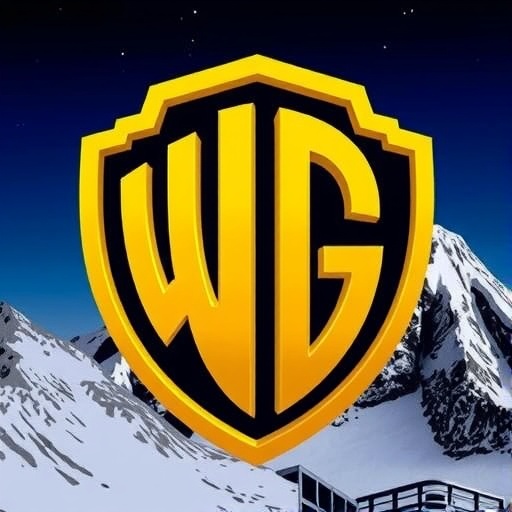Writers Guild of America Voices Fierce Opposition to Paramount-Skydance and Warner Bros Discovery Merger Amid Worker Rights Concerns
In a bold stand against corporate consolidation in Hollywood, the Writers Guild of America (WGA) has issued a scathing rebuke of the proposed merger between Paramount Global and Skydance Media, intertwined with Warner Bros Discovery’s ongoing restructuring efforts. This opposition, announced on Thursday, highlights deep fears over job losses, diminished creative voices, and a shrinking competitive landscape in the media industry. As streaming giants battle for dominance, the WGA warns that such a union could spell disaster for thousands of writers and the future of storytelling in America.
The merger talks, which gained momentum earlier this year, aim to create a media powerhouse valued at over $30 billion, combining Paramount’s vast library of films and TV shows with Skydance’s innovative animation and production prowess, while Warner Bros Discovery eyes further synergies. However, the WGA, representing over 20,000 film and TV writers, argues that this deal prioritizes shareholder profits over worker protections, potentially leading to widespread layoffs and reduced bargaining power. “This merger isn’t just about numbers on a balance sheet; it’s about erasing the livelihoods of the very creators who fuel this industry,” stated WGA West President Meredith Stiehm in the guild’s official statement.
WGA’s Stark Warning: Job Cuts and Creative Stifling on the Horizon
The Writers Guild of America‘s opposition stems from a detailed analysis of how the merger could reshape the media industry. According to the WGA, similar consolidations in recent years have resulted in significant workforce reductions. For instance, following the 2019 merger of WarnerMedia and Discovery, over 3,500 employees were let go, including writers and production staff. The guild fears a repeat scenario, projecting up to 10,000 job losses across the combined entity if the Paramount-Skydance deal proceeds alongside Warner Bros Discovery’s integrations.
“We’ve seen this playbook before,” explained David Goodman, WGA East President, during a virtual press briefing. “Mergers promise efficiency, but they deliver cuts. Writers are the first to feel the squeeze when studios consolidate, with scripts greenlit less frequently and diverse voices sidelined.” The WGA’s concerns are backed by data from the U.S. Bureau of Labor Statistics, which reported a 5% decline in media and entertainment employment since 2020, attributing much of it to industry mergers and the shift to streaming models.
To illustrate the potential impact, the guild released a report estimating that the merged company could control up to 25% of the U.S. streaming market share. This dominance, they argue, would reduce incentives for competitive bidding on scripts, leading to lower residuals for writers. Residuals, which are payments for reruns and streaming views, already saw a 20% drop industry-wide post the 2023 WGA strike, and further consolidation could exacerbate this trend.
Breaking Down the Numbers: Projected Losses for Writers
- Job Reductions: An estimated 5,000-7,000 positions in writing and development could be eliminated within the first two years.
- Market Share Shift: The new entity might hold 40% of premium content distribution, squeezing independent producers.
- Residual Impacts: Writers could see a 15-25% cut in streaming residuals due to internal reallocations.
These figures aren’t speculative; they’re drawn from precedents like the AT&T-Time Warner merger, where creative departments bore the brunt of cost-saving measures. The WGA is calling on regulators, including the Federal Trade Commission (FTC), to scrutinize the deal under antitrust laws, emphasizing how it could harm competition in the media industry.
Hollywood’s Merger Mania: How Paramount and Warner Bros Fit the Pattern
The proposed merger isn’t occurring in a vacuum. The media industry has been a hotbed of consolidations, driven by the need to compete with tech behemoths like Netflix, Amazon, and Disney+. Paramount Global, once a titan under the ViacomCBS banner, has struggled with declining cable revenues, reporting a $8.5 billion loss in 2023 largely due to write-downs on its Paramount+ streaming service. Skydance Media, known for hits like Mission: Impossible and Top Gun: Maverick, offers a lifeline through its $2.5 billion investment, but the WGA sees it as a wolf in sheep’s clothing.
Warner Bros Discovery, formed from the 2022 merger of WarnerMedia and Discovery Inc., has already slashed costs by $4 billion, including canceling high-profile projects and laying off 1,000 employees in 2023 alone. CEO David Zaslav’s aggressive strategy has drawn ire from creatives, with the WGA previously criticizing Warner for unfair labor practices during the 2023 strike. Now, whispers of deeper ties between Warner Bros and the Paramount-Skydance entity suggest a broader consolidation wave that could redefine Hollywood.
Industry analysts point to the 2019 Disney-Fox merger as a cautionary tale. That $71 billion deal led to 4,000 job cuts and the shuttering of Fox’s animation studio, directly affecting writers. “Paramount and Warner Bros are following the same script,” noted Eric Schrier, former head of 20th Century Fox Television. “The media industry is consolidating to survive streaming wars, but at what cost to the talent pool?”
The WGA’s opposition letter, addressed to Paramount CEO Bob Bakish and Skydance founder David Ellison, details how the merger could violate the guild’s Minimum Basic Agreement, which mandates fair compensation and job security. It also highlights Warner Bros Discovery’s role, accusing the company of using merger talks to undermine union negotiations.
Key Players in the Deal: Profiles of Power
- Paramount Global: Home to CBS, MTV, and Nickelodeon, facing $14.6 billion in debt.
- Skydance Media: Backed by private equity, focusing on high-budget franchises.
- Warner Bros Discovery: Controls HBO, CNN, and DC Comics, with a market cap of $20 billion post-merger turbulence.
These entities together represent a treasure trove of IP, from Star Trek to The Batman, but the WGA argues that concentrated ownership stifles innovation, leading to formulaic content that prioritizes algorithms over artistry.
Voices from the Frontlines: Writers and Allies Rally Against the Merger
The WGA’s stance has ignited a chorus of support from Hollywood’s creative community. Prominent writers like Shonda Rhimes and Ryan Murphy have voiced solidarity on social media, with Rhimes tweeting, “Consolidation killed the mid-budget film; now it’s coming for our scripts. Stand with the WGA!” Unions such as the Screen Actors Guild-American Federation of Television and Radio Artists (SAG-AFTRA) echoed these sentiments, warning of a “domino effect” on all below-the-line workers.
Experts in media law are also weighing in. Professor Amanda Lotz from the University of Michigan’s Department of Communication Studies described the merger as “a threat to cultural diversity.” In a recent op-ed for Variety, she argued that reduced competition could lead to homogenized programming, citing how post-merger Warner Bros has favored tentpole franchises over original series, resulting in a 30% drop in diverse writer hires since 2022.
Statistics from the Writers Guild Foundation underscore the urgency: Women and writers of color make up only 40% of employed scribes, a figure that could plummet with fewer opportunities. The guild’s advocacy arm has launched a petition drive, amassing over 50,000 signatures in 48 hours, demanding congressional hearings on media mergers.
Even some insiders from the studios are speaking out anonymously. A Warner Bros development executive told The Hollywood Reporter, “This merger will gut our script rooms. We’re already stretched thin; combining with Paramount means survival of the fittest, and that’s not good for storytelling.” The WGA is leveraging these voices to pressure lawmakers, including Senator Elizabeth Warren, who has championed antitrust reforms in Big Tech and now eyes Hollywood.
Alliance Building: Broader Labor Support Emerges
The opposition isn’t isolated. The International Alliance of Theatrical Stage Employees (IATSE) has pledged support, noting that technical crews could face 20% workforce reductions. Together, these unions represent over 100,000 workers, forming a formidable bloc against the merger.
Regulatory Scrutiny Looms: Antitrust Battles and Future Implications
As the dust settles on the WGA’s announcement, eyes turn to Washington. The FTC, under Chair Lina Khan, has ramped up oversight of media deals following the blocked Adobe-Figma acquisition. Khan’s “hippopotamus theory”—targeting large mergers that stifle innovation—directly applies here, with the agency already investigating streaming market concentrations.
The Department of Justice (DOJ) could invoke Section 7 of the Clayton Act, which prohibits mergers that substantially lessen competition. In the media industry, this means assessing how Paramount-Skydance-Warner Bros would control ad revenue streams, estimated at $50 billion annually. A 2023 FTC report highlighted that the top five media conglomerates already hold 80% of the market, and this merger could push that to 90%.
Looking ahead, the WGA is preparing for prolonged negotiations. If the merger advances, guild leaders plan rolling work stoppages, reminiscent of the 2023 strike that cost studios $5 billion. “We’re not backing down,” affirmed Stiehm. “This is about preserving the soul of Hollywood.”
Broader implications ripple through the economy. The media industry employs 2.7 million Americans, contributing $700 billion to GDP. A successful opposition could set precedents for future deals, like rumored Comcast-NBCUniversal expansions, fostering a more equitable landscape. Conversely, approval might accelerate a trend toward vertical integration, where studios own everything from production to distribution, potentially raising consumer prices by 10-15% on subscriptions.
Stakeholders are mobilizing: Investors like RedBird Capital, backing Skydance, face pressure to include worker protections in deal terms. Warner Bros Discovery’s stock dipped 2% post-WGA statement, signaling market jitters. As hearings approach in Q1 2025, the battle lines are drawn, with the WGA at the forefront of a fight that could redefine the media industry for decades.
In the coming months, expect intensified lobbying, with the guild partnering with consumer groups like Public Knowledge to argue that diverse content benefits audiences. Whether this merger crumbles under scrutiny or reshapes entertainment remains to be seen, but one thing is clear: the Writers Guild of America is ready to write the next chapter—and it won’t be a happy ending for corporate giants.








